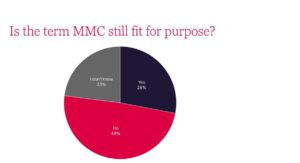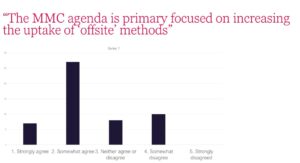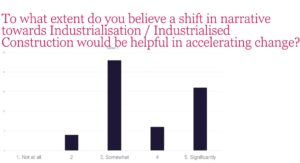On Thursday 25th April, the Offsite Manufacturing and Technology Group were joined by Ron Lang, Regional Director at AtkinsRealis, to participate in a debate about why we should shift our focus towards industrialisation if we are to create a modern industry that embraces technological development, that attracts and retains the best talent and that efficiently delivers high quality outputs that meet the needs of society.

Traditional Project Delivery Model
The narrative around MMC is changing. There are increasing calls for government to embrace the principles of ‘industrialisation’ as a means to unlocking productivity in the construction sector. The proposed shift in narrative recognises that our long-held interest in the adoption of manufacturing processes and technologies as a means to higher productivity requires a fundamental change in our traditional project delivery model.

The traditional construction delivery model promotes constant reinvention in what we deliver and how we deliver it, encouraging a mindset that focuses on: what’s the best, lowest risk approach to delivering this project?
This model…
- leads to constant reinvention in what and how we deliver.
- decreases efficiency and predictability and prevents continuous improvement in project performance.
- leads to a reliance on craft skills and site-based processes, preventing true adoption of ‘offsite’ production.
Industrialised Construction
On the other hand, Industrialised Construction approaches are focused on driving standardisation, repeatability and continuous improvement, promoting a mindset that asks: what’s the most efficient way to deliver this pipeline of ‘products’?
These approaches are centred around standard technical systems, repeatable processes & stable relationships; common elements that are intended to be repeatedly deployed and continuously improved across a number of projects. By doing this, we can create the conditions for manufacturing supply chains to thrive, and embrace more productive approaches to design, logistics, assembly and beyond.
For more, read An Introduction to Industrialised Construction. (CLC Council).
Benefits of Industrialised Construction
Through standardisation and repeatable processes, there a number of benefits  that could be brought to industry, including:
that could be brought to industry, including:
- Improved health and safety
- Inreaded productivity
- Reduced waste
- Lower defects
- Increased predictability
- Increased labour accessibility
All of these benefits will create a positive impact across the construction industry, for example:
Therefore
- Reduced labour demand
- Reduced embodied carbon
- Reduced operational carbon

How Does Industrialised Construction Relate to MMC?
MMC is an umbrella term used by the UK government to describe a range of non-traditional building methods. These are grouped into 7 ‘categories’ with 2 main focuses:
- Pre-manufacturing: incorporation of systems/elements manufactured ‘offsite’.
-3D primary structural systems.
-2D primary structural systems.
-components (non-systemised primary structure).
-non-structural assemblies and sub-assemblies. - Innovation in site-based processes.
-traditional building product led site labour reduction/productivity improvements.
-site process led site labour reduction/productivity/assurance improvements.
-additive manufacturing (structural and non-structural).
Shifting the Narrative
So what’s the difference?
The MMC agenda encourages the adoption of pre-manufactured solutions but fails to recognise or enable the crucial changes required to the traditional delivery model to make these solutions viable. It focuses on embracing alternative methods and techniques rather than alternative delivery models.
The Industrialised Construction agenda aims to transform the underlying delivery/production model within the construction industry.
![]()
The 3 States
The CLC have identified 3 states in the shift from MMC to Industrialised Construction:

The Current State is the MMC agenda and focuses on pre-manufactured elements within specific projects.
As we shift the narrative and move towards Industrialised Construction we will enter the Emerging State which aims towards standard technical systems, repeatable processes and stable relationships deployed within specific programmes of work.
Finally, we hope to reach the Future State in which we will see standard technical systems, repeatable processes and stable relationships deployed across multiple clients and programmes.
Industrialised Construction Playbook
Over the coming months, the CLC will be working towards the development of an Industrialised Construction Playbook to provide guidance to government & clients enabling them to best prepare set up for the Industrialised Construction approach.
Within this, there will be guidance around:
Demand: Industrialised Construction approaches require stable, aggregated demand and rationalised client requirements.
Develop: Industrialised Construction approaches are centred around the adoption of standard, repeatable systems, processes & relationships.
Deploy: by embracing standardisation and repeatability in systems, processes and people, projects and more predictable outcomes.
Outcomes
Prior to the call, we asked attendees to answer some questions about their views, opinions and feelings towards Industrialised Construction. The results can be seen below:
Following this session, attendees were again asked ‘To what extent do you believe a shift in narrative towards Industrialisation / Industrialised Construction would be helpful in accelerating change?’ . The positive responses increased, as below, indicating that there is a general agreement amongst industry professionals that a s shift is needed.
Get Involved
Are you interested in industrialisation and other ‘offsite’ processes and strategies? Why not come along to one of our Offsite Manufacturing and Technology Group sessions? Or check out our other groups and see what other exciting events we have coming up.








